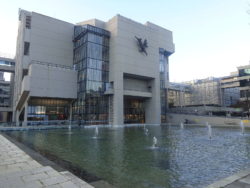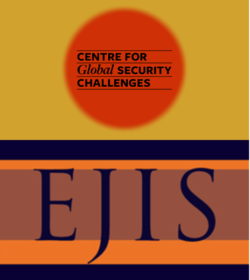Podcast
Insecure: A Security Podcast

We are delighted to announce the new PGR and ECR led podcast ‘Insecure: A Security Podcast’ funded by the Centre for Global Security Challenges (CGSC).
The creation of the channel marks an exciting development in the collaborative research culture of the CGSC and POLIS at the University of Leeds, providing a new platform to discuss the centre members’ cutting-edge research and disseminate it to a diverse audience.
Each episode will engage with one of the CGSC’s core research themes whilst engaging with the range of scholarship taking place within the CGSC and relevant current events. Listeners will be encouraged to engage with upcoming podcast topics by submitting their questions to us and the speakers on Twitter @InsecurePod.
The podcast is hosted by Marine Guéguin (@GueguinMarine), a postgraduate researcher in POLIS, and Dr Harrison Swinhoe (@HarrySwinhoe), with the goal of advancing the CGSC’s innovative research by strengthening the centre’s existing research culture and fostering new academic relationships between postgraduates, early career researchers and more established academics.
Guests on the channel will have the chance to showcase their work to a diverse audience whilst critically engaging with the implications of work for both policy and future research.
Follow ‘Insecure: A Security Podcast’ on Twitter and contact us via email at insecurepodcast@outlook.com
Season 1 Episode 1 - COP26 and The Future of Climate Research
 The debut episode of Insecure: A Security Podcast discusses environmental security and COP 26 with Prof. Richard Beardsworth, the Head of the School of Politics and International Studies at the University of Leeds, and Dr. Nicole Nisbett, a Postdoctoral Research Fellow at the University of Leeds.
The debut episode of Insecure: A Security Podcast discusses environmental security and COP 26 with Prof. Richard Beardsworth, the Head of the School of Politics and International Studies at the University of Leeds, and Dr. Nicole Nisbett, a Postdoctoral Research Fellow at the University of Leeds.
This fascinating discussion explores how climate change is securitised by different actors, actors’ different experiences of climate change and climate diplomacy, the potential conflict between climate security and other forms of security, and how does the Russian invasion of Ukraine impact on the challenge of climate change and the need for climate action. In doing so the episode seeks to address the central question: is the world more secure or insecure today as a result of COP 26?
Season 1 Episode 2 - The Future of Terrorism Studies
 In this second episode of Insecure: A Security Podcast we discuss the future of terrorism studies with Dr Gordon Clubb, Associate Professor in Terrorism at the University of Leeds and a Research Fellow at the German Institute for Radicalisation and De-Radicalisation Studies and Mohammad Didarul Islam, a PhD student at the University of Leeds and an Assistant Professor at the University of Dhaka.
In this second episode of Insecure: A Security Podcast we discuss the future of terrorism studies with Dr Gordon Clubb, Associate Professor in Terrorism at the University of Leeds and a Research Fellow at the German Institute for Radicalisation and De-Radicalisation Studies and Mohammad Didarul Islam, a PhD student at the University of Leeds and an Assistant Professor at the University of Dhaka.
This fascinating discussion explores current and emerging trends within terrorism studies, the nature of ‘the terrorist threat’, and the relationship between the study of terrorism, extremism, and CVE (counter-violent extremism).
It also showcases the research undertaken by both our speakers on CVE and deradicalisation in different contexts, as well as, their thoughts on the current state of terrorism studies and the existing literature.
Season 1 Episode 2a - Bonus episode - The future of Terrorism Studies: Introducing our Hosts!
 In this bonus episode Dr Harrison Swinhoe and Marine Gueguin discuss their own research within terrorism studies.
In this bonus episode Dr Harrison Swinhoe and Marine Gueguin discuss their own research within terrorism studies.
Dr Harrison Swinhoe is an Early Career Research at the University of Leeds. His PhD thesis explored how the Islamic State’s strategic narratives of sovereignty and political legitimacy were constructed through the English language propaganda content produced by the group between 2014 and 2017. In so doing his thesis analysed a range of discourses constructed by the Islamic State and the relationship between these discourses and the group’s strategic narratives of sovereignty and political legitimacy. This thesis was supervised by Pr Jack Holland and Dr Gordon Clubb. Dr Swinhoe has also published an article in Critical Studies on Terrorism entitled, '“They are not muslims. They are monsters”: the accidental takfirism of British political elites', which explored discursive practices utilised by British political elites to police the boundaries of religion and the potential implications and risks of these discursive practices.
Season 2 Episode 1 - We're Back and Better Than Ever!

In this first episode of Season Two, Dr Marine Gueguin and Dr Harrison Swinhoe discuss the future of their research, both as Early Career Researchers and Research Fellows at the University of Leeds.
In this fascinating conversation, Marine discusses her recent research including a forthcoming book chapter in an edited volume for Manchester University Press in which she analyses the colonial legacies of French counterterrorism strategy in securitising the terrorist bodies in response to the threat of terrorism. Additionally we discuss a Special Issue which she has contributed to and which is soon to be published in the Cambridge Review of International Affairs, where she writes about the analysis undertaken on the French political discourse and the framing of the terrorist threat to uncover the securitisation framework in November 2015.
Learn more about Marine's research here
Harry discusses a paper which he recently presented at the ISA Annual Convention 2024 in which he compared representations of the ‘nation’ and ‘nationalism’ in the English language propaganda produced by the Islamic State and Hay’at Tahrir al-Sham.
Season 2 Episode 2 - The future of Security Studies

In this second episode of Insecure: A Security Podcast Season 2, hosts Marine and Harry discuss the future of Security Studies with a number of guests from the University of Leeds. They answer questions which were put to them by undergraduate students taking the Security Studies module at the University of Leeds and address a key question: what is the future of security studies?
Guests on this podcast:
Dr Louise Pears - Lecturer of Global Security Challenges.
Prof. Jack Holland - Professor of Global Security Challenges.
Lucas de Belmont,- postgraduate researcher at the University of Leeds.
Mohamed Abdi Mohamood, postgraduate researcher at the University of Leeds.
Dr Laura Considine, Associate Professor in International Politics
Dr James Worrall, Associate Professor in International Relations and Middle East Studies.
Season 2 Episode 3 - CGSC and EJIS conference on 'Security in Time of Polycrisis'
 This third episode of Insecure: A Security Podcast Season 2 is a special episode as the CGSC and EJIS gave the podcast team an opportunity to be present at their conference “Security in times of polycrisis” in May 2023. The term ‘polycrisis’ has gained prominence over recent years as a way of articulating the sum of the multiple, intersecting crises of our contemporary world. In this episode, panelists Alba Griffin, Ishmael Billa, Jethro Norman, Natalie James and Katherine Pye speakwith Dr Harrison Swinhoe and Dr Marine Gueguin about their work.
This third episode of Insecure: A Security Podcast Season 2 is a special episode as the CGSC and EJIS gave the podcast team an opportunity to be present at their conference “Security in times of polycrisis” in May 2023. The term ‘polycrisis’ has gained prominence over recent years as a way of articulating the sum of the multiple, intersecting crises of our contemporary world. In this episode, panelists Alba Griffin, Ishmael Billa, Jethro Norman, Natalie James and Katherine Pye speakwith Dr Harrison Swinhoe and Dr Marine Gueguin about their work.
Season 2 Episode 4 - Civil Wars - from internationalised to localised conflicts
In this fourth episode of Insecure: A Security Podcast Season 2 hosts Dr Marine Gueguin & Dr Harry Swinhow discuss ‘Civil Wars: from internationalised to localised conflicts’ with Dr James Worrall, Dr Alex Waterman and Megghi Pengili.
